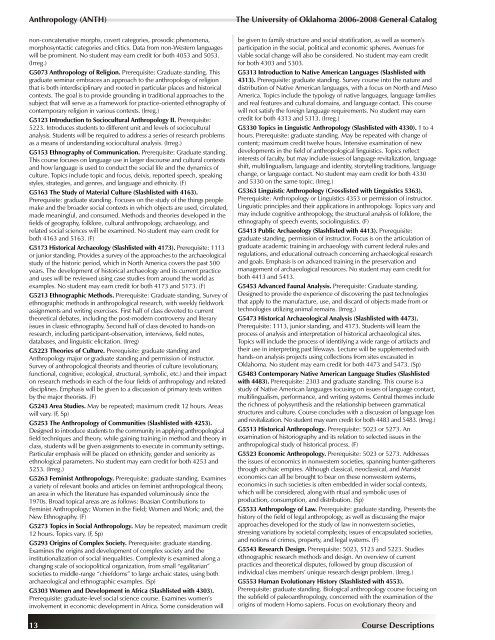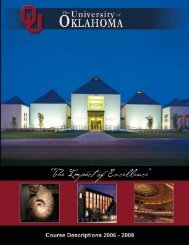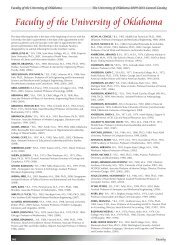ART - Catalog - University of Oklahoma
ART - Catalog - University of Oklahoma
ART - Catalog - University of Oklahoma
Create successful ePaper yourself
Turn your PDF publications into a flip-book with our unique Google optimized e-Paper software.
Anthropology (ANTH)<br />
The Uni ver sity <strong>of</strong> <strong>Oklahoma</strong> 2006-2008 Gen eral Cat a log<br />
non-concatenative morphs, covert categories, prosodic phenomena,<br />
morphosyntactic categories and clitics. Data from non-Western languages<br />
will be prominent. No student may earn credit for both 4053 and 5053.<br />
(Irreg.)<br />
G5073 Anthropology <strong>of</strong> Religion. Prerequisite: Graduate standing. This<br />
graduate seminar embraces an approach to the anthropology <strong>of</strong> religion<br />
that is both interdisciplinary and rooted in particular places and historical<br />
contexts. The goal is to provide grounding in traditional approaches to the<br />
subject that will serve as a framework for practice-oriented ethnography <strong>of</strong><br />
contemporary religion in various contexts. (Irreg.)<br />
G5123 Introduction to Sociocultural Anthropology II. Prerequisite:<br />
5223. Introduces students to different unit and levels <strong>of</strong> sociocultural<br />
analysis. Students will be required to address a series <strong>of</strong> research problems<br />
as a means <strong>of</strong> understanding sociocultural analysis. (Irreg.)<br />
G5153 Ethnography <strong>of</strong> Communication. Prerequisite: Graduate standing.<br />
This course focuses on language use in larger discourse and cultural contexts<br />
and how language is used to conduct the social life and the dynamics <strong>of</strong><br />
culture. Topics include topic and focus, deixis, reported speech, speaking<br />
styles, strategies, and genres, and language and ethnicity. (F)<br />
G5163 The Study <strong>of</strong> Material Culture (Slashlisted with 4163).<br />
Prerequisite: graduate standing. Focuses on the study <strong>of</strong> the things people<br />
make and the broader social contexts in which objects are used, circulated,<br />
made meaningful, and consumed. Methods and theories developed in the<br />
fields <strong>of</strong> geography, folklore, cultural anthropology, archaeology, and<br />
related social sciences will be examined. No student may earn credit for<br />
both 4163 and 5163. (F)<br />
G5173 Historical Archaeology (Slashlisted with 4173). Prerequisite: 1113<br />
or junior standing. Provides a survey <strong>of</strong> the approaches to the archaeological<br />
study <strong>of</strong> the historic period, which in North America covers the past 500<br />
years. The development <strong>of</strong> historical archaeology and its current practice<br />
and uses will be reviewed using case studies from around the world as<br />
examples. No student may earn credit for both 4173 and 5173. (F)<br />
G5213 Ethnographic Methods. Prerequisite: Graduate standing. Survey <strong>of</strong><br />
ethnographic methods in anthropological research, with weekly fieldwork<br />
assignments and writing exercises. First half <strong>of</strong> class devoted to current<br />
theoretical debates, including the post-modern controversy and literary<br />
issues in classic ethnography. Second half <strong>of</strong> class devoted to hands-on<br />
research, including participant-observation, interviews, field notes,<br />
databases, and linguistic elicitation. (Irreg)<br />
G5223 Theories <strong>of</strong> Culture. Prerequisite: graduate standing and<br />
Anthropology major or graduate standing and permission <strong>of</strong> instructor.<br />
Survey <strong>of</strong> anthropological theorists and theories <strong>of</strong> culture (evolutionary,<br />
functional, cognitive, ecological, structural, symbolic, etc.) and their impact<br />
on research methods in each <strong>of</strong> the four fields <strong>of</strong> anthropology and related<br />
disciplines. Emphasis will be given to a discussion <strong>of</strong> primary texts written<br />
by the major theorists. (F)<br />
G5243 Area Studies. May be repeated; maximum credit 12 hours. Areas<br />
will vary. (F, Sp)<br />
G5253 The Anthropology <strong>of</strong> Communities (Slashlisted with 4253).<br />
Designed to introduce students to the community in applying anthropological<br />
field techniques and theory. while gaining training in method and theory in<br />
class, students will be given assignments to execute in community settings.<br />
Particular emphasis will be placed on ethnicity, gender and seniority as<br />
ethnological parameters. No student may earn credit for both 4253 and<br />
5253. (Irreg.)<br />
G5263 Feminist Anthropology. Prerequisite: graduate standing. Examines<br />
a variety <strong>of</strong> relevant books and articles on feminist anthropological theory,<br />
an area in which the literature has expanded voluminously since the<br />
1970s. Broad topical areas are as follows: Boasian Contributions to<br />
Feminist Anthropology; Women in the Field; Women and Work; and, the<br />
New Ethnography. (F)<br />
G5273 Topics in Social Anthropology. May be repeated; maximum credit<br />
12 hours. Topics vary. (F, Sp)<br />
G5293 Origins <strong>of</strong> Complex Society. Prerequisite: graduate standing.<br />
Examines the origins and development <strong>of</strong> complex society and the<br />
institutionalization <strong>of</strong> social inequalities. Complexity is examined along a<br />
changing scale <strong>of</strong> sociopolitical organization, from small “egalitarian”<br />
societies to middle-range “chiefdoms” to large archaic states, using both<br />
archaeological and ethnographic examples. (Sp)<br />
G5303 Women and Development in Africa (Slashlisted with 4303).<br />
Prerequisite: graduate-level social science course. Examines women’s<br />
involvement in economic development in Africa. Some consideration will<br />
be given to family structure and social stratification, as well as women’s<br />
participation in the social, political and economic spheres. Avenues for<br />
viable social change will also be considered. No student may earn credit<br />
for both 4303 and 5303.<br />
G5313 Introduction to Native American Languages (Slashlisted with<br />
4313). Prerequisite: graduate standing. Survey course into the nature and<br />
distribution <strong>of</strong> Native American languages, with a focus on North and Meso<br />
America. Topics include the typology <strong>of</strong> native languages, language families<br />
and real features and cultural domains, and language contact. This course<br />
will not satisfy the foreign language requirements. No student may earn<br />
credit for both 4313 and 5313. (Irreg.)<br />
G5330 Topics in Linguistic Anthropology (Slashlisted with 4330). 1 to 4<br />
hours. Prerequisite: graduate standing. May be repeated with change <strong>of</strong><br />
content; maximum credit twelve hours. Intensive examination <strong>of</strong> new<br />
developments in the field <strong>of</strong> anthropological linguistics. Topics reflect<br />
interests <strong>of</strong> faculty, but may include issues <strong>of</strong> language revitalization, language<br />
shift, multilingualism, language and identity, storytelling traditions, language<br />
change, or language contact. No student may earn credit for both 4330<br />
and 5330 on the same topic. (Irreg.)<br />
G5363 Linguistic Anthropology (Crosslisted with Linguistics 5363).<br />
Prerequisite: Anthropology or Linguistics 4353 or permission <strong>of</strong> instructor.<br />
Linguistic principles and their applications in anthropology. Topics vary and<br />
may include cognitive anthropology, the structural analysis <strong>of</strong> folklore, the<br />
ethnography <strong>of</strong> speech events, sociolinguistics. (F)<br />
G5413 Public Archaeology (Slashlisted with 4413). Prerequisite:<br />
graduate standing, permission <strong>of</strong> instructor. Focus is on the articulation <strong>of</strong><br />
graduate academic training in archaeology with current federal rules and<br />
regulations, and educational outreach concerning archaeological research<br />
and goals. Emphasis is on advanced training in the preservation and<br />
management <strong>of</strong> archaeological resources. No student may earn credit for<br />
both 4413 and 5413.<br />
G5453 Advanced Faunal Analysis. Prerequisite: Graduate standing.<br />
Designed to provide the experience <strong>of</strong> discovering the past technologies<br />
that apply to the manufacture, use, and discard <strong>of</strong> objects made from or<br />
technologies utilizing animal remains. (Irreg.)<br />
G5473 Historical Archaeological Analysis (Slashlisted with 4473).<br />
Prerequisite: 1113, junior standing, and 4173. Students will learn the<br />
process <strong>of</strong> analysis and interpretation <strong>of</strong> historical archaeological sites.<br />
Topics will include the process <strong>of</strong> identifying a wide range <strong>of</strong> artifacts and<br />
their use in interpreting past lifeways. Lecture will be supplemented with<br />
hands-on analysis projects using collections from sites excavated in<br />
<strong>Oklahoma</strong>. No student may earn credit for both 4473 and 5473. (Sp)<br />
G5483 Contemporary Native American Language Studies (Slashlisted<br />
with 4483). Prerequisite: 2303 and graduate standing. This course is a<br />
study <strong>of</strong> Native American languages focusing on issues <strong>of</strong> language contact,<br />
multilingualism, performance, and writing systems. Central themes include<br />
the richness <strong>of</strong> polysynthesis and the relationship between grammatical<br />
structures and culture. Course concludes with a discussion <strong>of</strong> language loss<br />
and revitalization. No student may earn credit for both 4483 and 5483. (Irreg.)<br />
G5513 Historical Anthropology. Prerequisite: 5023 or 5273. An<br />
examination <strong>of</strong> historiography and its relation to selected issues in the<br />
anthropological study <strong>of</strong> historical process. (F)<br />
G5523 Economic Anthropology. Prerequisite: 5023 or 5273. Addresses<br />
the issues <strong>of</strong> economics in nonwestern societies, spanning hunter-gatherers<br />
through archaic empires. Although classical, neoclassical, and Marxist<br />
economics can all be brought to bear on these nonwestern systems,<br />
economics in such societies is <strong>of</strong>ten embedded in wider social contexts,<br />
which will be considered, along with ritual and symbolic uses <strong>of</strong><br />
production, consumption, and distribution. (Sp)<br />
G5533 Anthropology <strong>of</strong> Law. Prerequisite: graduate standing. Presents the<br />
history <strong>of</strong> the field <strong>of</strong> legal anthropology, as well as discussing the major<br />
approaches developed for the study <strong>of</strong> law in nonwestern societies,<br />
stressing variations by societal complexity, issues <strong>of</strong> encapsulated societies,<br />
and notions <strong>of</strong> crimes, property, and legal systems. (F)<br />
G5543 Research Design. Prerequisite: 5023, 5123 and 5223. Studies<br />
ethnographic research methods and design. An overview <strong>of</strong> current<br />
practices and theoretical disputes, followed by group discussion <strong>of</strong><br />
individual class members’ unique research design problem. (Irreg.)<br />
G5553 Human Evolutionary History (Slashlisted with 4553).<br />
Prerequisite: graduate standing. Biological anthropology course focusing on<br />
the subfield <strong>of</strong> paleoanthropology, concerned with the examination <strong>of</strong> the<br />
origins <strong>of</strong> modern Homo sapiens. Focus on evolutionary theory and<br />
13 Course Descriptions








